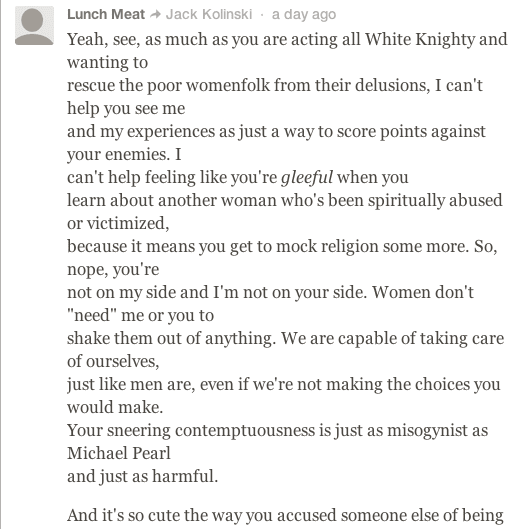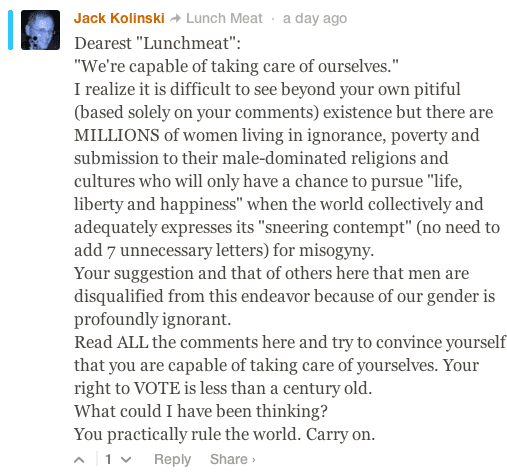 One strategy frequently used by male atheists attempting to deconvert religious women is to point to the ways religion oppresses women. This is fine, if it is accompanied with an understanding that not all religion oppresses women, an awareness that atheism does not eliminate sexism, and a wider commitment to challenging the oppression of women in every forum where it surfaces. But all too often, it’s not accompanied by these things. In fact, there are all too many times when pointing out the religious oppression of women is more a tactic designed to score points against an enemy than an actual attempt to listen to and improve the well-being of actual women.
One strategy frequently used by male atheists attempting to deconvert religious women is to point to the ways religion oppresses women. This is fine, if it is accompanied with an understanding that not all religion oppresses women, an awareness that atheism does not eliminate sexism, and a wider commitment to challenging the oppression of women in every forum where it surfaces. But all too often, it’s not accompanied by these things. In fact, there are all too many times when pointing out the religious oppression of women is more a tactic designed to score points against an enemy than an actual attempt to listen to and improve the well-being of actual women.
One example of this phenomenon is Richard Dawkins himself, who continually and monolithically denounces how Islam positions women while responding with belligerence and obfuscation when his own sexism is pointed out to him (see here, here, here, here, here, here, here, here, and here). But my goal here is not to focus on Dawkins. I mention him only as an illustration of how deep this problem goes. In this post I want to illustrate my concerns by drawing from the words of a recent short-lived commenter. While the solid majority of male atheists will (almost certainly) never come anywhere near being as egregious or obvious as this individual, I want to use this example to illustrate and challenge a pattern that is more widespread than it should be.
The day before yesterday, Jack dove into my comment section and spent several hours interacting with commenters there. The entire episode took place on one of the reviews of Michael Pearl’s book. In that post, guest blogger Aletha, a Mormon deconvert, outlined the problems with Michael Pearl’s prescriptions for marital relationships, prescription he, as a fundamentalist pastor, drew from various biblical passages. It is Jack’s time in the comment section on this post that I want to draw from. Here is Jack’s initial comment:
There are a couple of problems with this comment. First, it assumes that Michael Pearl’s interpretation of the Bible is the correct one and ignores the multiplicity of Biblical interpretations, especially, the interpretations promoted by Christian feminists. Second, it assumes that women are Christians because they have simply never “read & understood” what the Bible says, a manifestly false claim and a claim that is more than a little demeaning. Third, it generalizes to all religion, even though not all religion is sexist or oppressive toward women.
Not surprisingly, Jack immediately got pushback, and then engaged with commenters in back-and-forth discussions. In no specific order, some of my regular commenters brought up each of the points I made above.
Rather than responding to this comment by acknowledging that there are various interpretations of the Bible, Jack responded with this:
Posing as a defender of women and claiming to be appalled by religious sexism . . . and then making quips about estrogen? I’m sorry, but no. That’s both sexist and extremely demeaning—and also way more common than it should be. As the exchange continued, Jack didn’t exactly improve the situation.
Jack’s response to another commenter pointing out that quips about estrogen are sexist—and helpfully detailing why—is to claim that that commenter is being sexist. Seriously, what? Jack helpfully reminds us that atheists, too, can be sexist, including atheists who are trying to deconvert women by explaining to them just how anti-woman religion is. Jack says something sexist, is called out on it, and responds by doubling down. Does Jack think he can’t be sexist because he’s not religious? Does he think railing against sexism in religion somehow gives him a pass? Because it doesn’t. It really, really doesn’t.
Another commenter then responded to Jack’s original comment, using sarcasm to make a point:
This approach is so, so very wrong. If you want to persuade someone of your beliefs, you don’t do it by insulting them, being condescending toward them, and refusing to listen to them. But there’s more here than just that. Equally unhelpful is the idea that religious women are simply mindless dupes waiting around for some man to come “shake them out of their imaginary friend fairyland.” There’s no acknowledgement that women might possibly choose to be religious for some reason other than being mindless dupes.
Granted, the argument could be made that individuals like Jack see everyone who is religious as a conned and in need of liberation from the “prison” of religion. Actually, though, I find that because the most prominent world religions have traditionally oppressed women, women’s continued involvement in these religions can be baffling to individuals like Jack. These individuals often don’t take the time to think about actual reasons why women may continue to be attracted to religion and instead view women as especially confused or duped and therefore embark on an ostensible quest to liberate them. It’s important to remember the backdrop that all of this occurs on—for much of history women have had to fight to be treated as individuals with thoughts and values and views of their own, and this assumption that religious women are brainless dupes once again robs them of agency.
So, let’s see. So far Jack has (a) been blatantly sexist; and (b) argued that religious women can’t be other than mindless dupes. Up next: Jack denies women’s actual experiences.
It’s not Jack’s position to define Rachel’s experience—or any woman’s experience, actually. Rachel pointed out that Jack was telling women how they should feel about and interpret scripture—which is, by the way, exactly what all to many male Christian pastors and priests already do—and he responded by once again telling her how to feel about and interpret scripture. There is nothing okay about that. If Rachel has had no problem reconciling her faith and her feminism, Jack needs to drop his All Religion Is Demeaning To Women line of reasoning, because it’s not going to work and, quite frankly, it’s continuing with this strategy and in the process ignoring and discounting what Rachel has said is itself very demeaning.
Not all religion is oppressive toward women. Some religious traditions have long been egalitarian, and others that were traditionally oppressive toward women have since changed. Further, there are plenty of women like Rachel who are actively working to make religion more egalitarian and more feminist. To deny all of this not only denies reality but also denies women’s own experiences. And it gets worse—promoting the idea that all religion is anti-women plays into conservative hands by erasing the existence of progressive religion. And that’s bad.
Two additional commenters attempted to explain to Jack what was going on—and did a very good job, I think, of calling him out for his behavior and his approach to the issue. They pointed out that in addition to (a) being sexist; (b) arguing that religious women can’t be other than mindless dupes; and (c) denying women’s lived experience with feminist religious traditions, Jack was also (d) ignoring the diversity of religious traditions; and (e) playing the rescuer and defender of women solely in an attempt to score points against religion. Jack’s response was to continue his denigration and condescension toward women.
What was perhaps most bizarre about the entire situation was that Jack appeared to be under the impression that he was promoting female equality and displaying contempt for misogyny without (apparently) realizing that he himself was engaging in exactly what he claimed to be condemning, and blatantly so. Check out the end of each of these comments, for instance:
And there’s more of the same, but I’m tired of making screenshots.
In the end, Lunch Meat hit it on the head—Jack didn’t care about women, he cared about scoring points. If he cared about women, he would have listened to what they had to say. They told him that he was robbing women of agency, denying them their experiences, unfairly generalizing regarding religion and gender, and being condescending and patronizing toward them—all of which he was indeed doing—and he responded with insults. There is nothing feminist or positive toward women’s equality about that.
It’s way more complicated than “religion = bad to women” and “atheism = good to women.” Women like Feminerd and Lunch Meat and Rachel and myself know that—but Jack didn’t care, because he was more interested in having a simple dichotomy that would allow him to score points than he is in what would actually improve women’s situations and well-being. Jack’s talk about the religious oppression of women was first and foremost about growing the atheist ranks, not about actually improving women’s lives or challenging patriarchal oppression.
Far too many atheists appear to think that so long as they’re not religious, they surely can’t be sexist. This is wrong. Very wrong. Sexism does not cease at the church door. If a male atheist wants to attempt to deconvert women by focusing on the sexism imbedded in many religions, he needs to make sure that he’s not engaging in sexism himself, and he darned well better be ready to address his own sexism if it is pointed out to him. Arguing that women shouldn’t be religious because religion is sexist while being belligerent and unwilling to address one’s own sexism is disingenuous to the extreme. And more than this, a male atheist who wants to deconvert a woman by focusing on the way religion has oppressed women needs to realize that the picture is more complicated than this, and that in simplifying it to a simple dichotomy he may come across as caring more about scoring points than about working towards women’s equality.
We are not points for you to score. We are people. We have our own lives, our own values, our own desires, and our own thoughts.
It’s not every day you see a male atheist so blatantly outline his own sexism while ostensibly attempting to rescue religious women from the sexist oppression of Big Bad Religion. But as an atheist blogger who focuses a lot on harm religion does to women, the themes that run through Jack’s comment are not new to me—rather, they are themes I have seen all too often. I cringe when male atheists come to my blog to leave comments that are almost jubilant about how terrible religion is to women and incredulous as to why women haven’t all deconverted by now, more interested in scoring points against religion than in understanding the complexity and nuance of the issue or listening to women and what they actually want and need from allies. And this sort of behavior is not marginal. Indeed, goes all the way to the top, and is engaged in by Richard Dawkins himself.
To be clear, this post is not meant to be any sort of blanket indictment of male atheists, and it should be noted that female atheists can fall into these traps as well (although in my experience this is much rarer). Nevertheless, if you are a male atheist and you are reading this and feeling defensive, please just consider what I’ve written. Please understand that if you are going talk about the sexist oppression of religion, you need to care about the problem of sexism in other arenas and to understand that not all religion is sexist or oppressive. You need to be willing to listen to women, to their experiences and feelings and ideas, rather simply telling them what they do or do not believe and what they should or should not believe. If you can’t do these things, your concern about the sexist oppression of women is shallow at best and dishonest at worst.
I don’t blog about the damage I’ve seen religion do to women so that atheism can win new members. I blog about it because I care about women, and want to make the world a better place for them regardless of what religion or lack thereof they choose to adhere to. I don’t blog on this topic so that atheists can work themselves up about how horrible religion is. I blog because I believe that change is possible in every arena. My enemy is not religion—it is sexism and misogyny. And as Jack has once again reminded me, the two—religion and sexism/misogyny—are absolutely not identical.
























